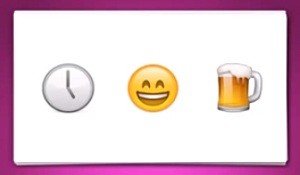I’m reasonably intelligent and yet the whole password/Pin number issue is one that regularly frustrates me. There are so many websites that I need a password for as well as PINS for my bank cards and a PIN and a password (*sobs*) to access online banking, it is a nightmare trying to remember what they all are. Several websites won’t ever allow you to re-use an old password so you eventually end up with a string of letters and numbers that are entirely meaningless and you have no way of remembering what they are.
Seriously! I don’t think this way! Factor in anything that wants to make sure you have a capital letter and a symbol as well as letters and numbers, and let’s face it, you’re just going to show two fingers to whatever it is you’re trying to access, aren’t you?So imagine my joy when I heard on the news yesterday that there is a British company who are revolutionising the world of online security – using the humble emoji to create an emoji PIN.
Yay for Emoji PIN! This appeals to me on a number of levels. Firstly I think emojis are cheerful little blighters, all bright colours and smiling appeal, secondly they make me smile, and thirdly, they appeal to my inner child. Personally, I can’t wait to use them!The company responsible for the emoji PIN are called Intelligent Environments, and they are in the process of launching their emoji alternative to the traditional four-digit Pin code commonly used to access your online banking. Intelligent Environments claim that the Emoji Passcode service (as they call it – emoji PIN as it will be more usefully known) is more secure because potentially there are more combinations available using the 44 emojis than there are of the numbers 0-9.
It’s so simple, it’s genius, isn’t it?
The managing director of Intelligent Environments, David Webber, says that the system is designed to appeal to 15-25-year-olds, so I’m a bit outside the target age range but I don’t care! Webber asks, “Why can’t financial service be fun and innovative?” because after all, it’s just another way to log in.
So, is this the future of cybersecurity?
I think that it would be a great idea to use a similar method of logging in on websites and maybe even at cash machines etc. Obviously there would need to be some software redesign, but how complicated could that be?
Of course every great idea has its critics. Michael Tipper, a former memory champion told the BBC that while the technique for remembering a sequence of either numbers or pictures was essentially the same, and “Fundamentally we are hard-wired to remember pictures,” he felt that lazy people would adopt the easiest approach.
Tipper says, “Statistically it will be harder to crack – but if you’re presented with a screen of emojis and you can’t be bothered to remember a sequence you’re going to pick the ones in the four corners or the top row – and then you are left with an equally insecure technology.”It’s hard to deny that we humans are fallible. Apparently, the most common passwords on the internet are “123456,” “password,” and — just to show a little bit of imagination — “12345678.” Some people must like to live dangerously!
Plenty of Emoji PIN combinations
There are 44 emoji which means there is the potential for 3.5 million unique combinations of emoji PINs. Intelligent Environments says you can create a four-character emoji PIN, meaning there are 3,498,308 possible permutations for non-repeating emoji passcodes, compared to just 7,290 for traditional non-repeating PIN. The traditional four-digit pin is a ridiculously feeble verification system. Certain common combinations, such as 9999, aren’t allowed by most banks. In fact there are so few possible permutations, this is why banks swallow your card if you forget the PIN too many times in a row – if you were allowed to guess indefinitely, even a slow typist could access a stolen card in less than 24 hours.
Another advantage of the emoji PIN is that you use a more subjective and personal choice for your combination. Rather than using your birthday or wedding – which can easily be guessed, instead you go for four emoji that appeal to your personal taste. Four kisses? Four raspberries? Four poops?
Intelligent Environments claim that 64% of millennials (whatever ‘millennials’ means – must be young dynamic graduate corporate speak for ‘people’) regularly communicate only using emojis. How true that is I don’t know. Maybe 15-25 year olds use emojis rather than grunting? Intelligent Environments quote global memory expert, Tony Buzan as saying that the emoji PIN “plays to humans’ extraordinary ability to remember pictures, which is anchored in our evolutionary history”. Buzan says that, “We remember more information when it’s in pictorial form.”
So what about online security using a password?
Apparently, an eight character password that only uses lower-case letters offers 208 billion combinations, making it 55,000 times better than an emoji passcode. In fact, most banks would rate an eight character lower-case password as “bad” security. A ten-character password using a mixture of upper and lower case letters, as well as numbers and special characters offers 7510 (that’s 5 quintillion combinations) – making it 1,502,456,572,870 times better than an emoji passcode.But just consider how much fun you could have using poops in your PIN. My emoji PIN would make my day, every day!
Over to you
What do you think of the idea? Do you use emojis? Do you communicate only in emojis? Come and do so on our Facebook page or leave a comment below. Here’s winking at you 😉
 Wholesale
Wholesale 





Comments are closed.